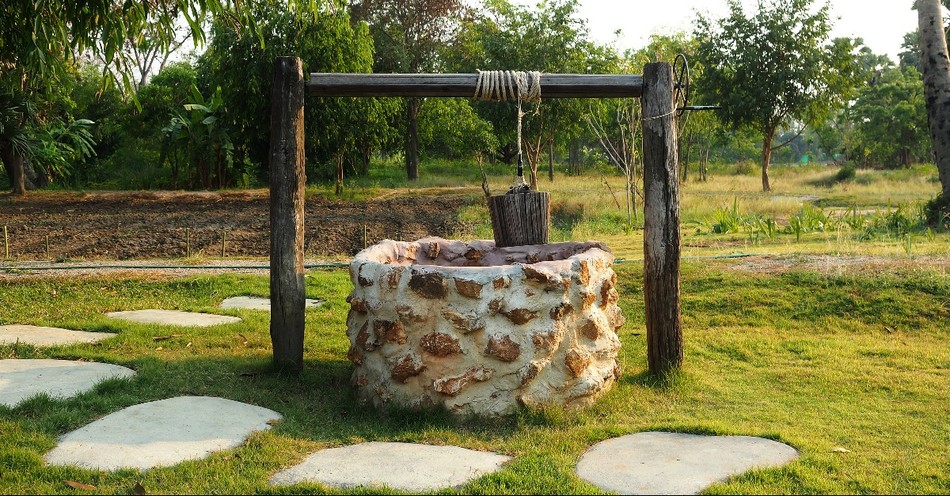She is never named, yet her encounter with Jesus is the longest between the Messiah and any other individual in the Gospel of John. Representing the lowest of the low — a female in a society where women are both demeaned and disregarded, a race traditionally despised by Jews, and living in shame as a social outcast — she not only has a holy encounter with Christ but also receives eternal salvation. And her testimony convinces an entire town to believe, too.
What was the significance of the woman at the well, and why is her tale important to Christian believers?
Who Was the Woman at the Well?
The story of the woman at the well is one of the most iconic encounters in the Bible. Told in John 4:1-42, it depicts how Jesus, traveling through Samaria on the way to Galilee, sat down at a well in the town of Sychar.
There, around noon, while His disciples were in town buying food, He encountered a Samaritan woman coming to draw water from the well. He asked her for a drink, and their talk took off from there — culminating in her salvation and many more from her town, too.
We are told a few key facts about this woman. While her name was never revealed, we know she was female and a Samaritan, a race with whom Jews did not associate, as Scripture explains. We know she had had five husbands, and the man she had currently was not her husband.
We also know, from understanding cultural and historical traditions of that time, that women typically drew water in groups in the morning, and it was often a social occasion. The fact that she was drawing water alone at midday probably indicates she was a social outcast.
And we also know she was deeply curious. She felt comfortable enough to not only talk with Jesus but also ask Him pointed questions.
His answers to those questions, and their ensuing dialogue, reveal a great deal more, adding even more significance to the story.
What Did the Woman at the Well Ask Jesus?
Her questions, without understanding inflection, tone of voice, facial expressions, and other characterizations, appear stark and pointed. She asked Jesus a series of questions when he requested a drink: How can you ask me for a drink? (v. 9) Where can you get this living water? (v. 11) Are you greater than our father Jacob, who gave us the well and drank from it himself, as did also his sons and his livestock? (v. 12)
His responses were just as pointed — and astonishing.
In short, Jesus told her not only who He was, the Son of God, the Messiah, but that He had come to offer living water, the kind that “will become in them a spring of water welling up to eternal life” (v. 14).
What is notable is the way all of this is revealed and the way she appeared to see through His parables and glimpse the truth behind His words when so many others, including Jewish experts and scholars, could not.
What Happened During Jesus’ Talk with the Woman at the Well?
After Jesus asked for a drink, the woman at the well asked how Jesus could ask this of her, as she was a Samaritan and Jesus was clearly a Jew. He replied, “If you knew the gift of God and who it is that asks you for a drink, you would have asked him, and he would have given you living water” (v. 10).
She pointed out that Jesus had no cup, then asked about this so-called living water, as well as if he was greater than Jacob. While the text does not reveal whether her tone was sarcastic, rhetorical, or fully sincere, many scholars suspect she was probably being facetious.
After all, Jacob was the grandson of Abraham, the son of Isaac, and the traditional ancestor of the people of Israel, who likely founded the town in addition to providing the well where they spoke. Jacob’s notoriety was great.
But Jesus’ clearly earnest answer, elaborating on this living water He could provide, prompted her to ask Him for it.
That’s when Jesus shifted to the next phase of their dialogue, which reveals that not only did He have what she needed, but He knew things about her that were both surprising and telling — that she had been married five times and was not married to her current man (v. 18).
Now inferring Jesus was a prophet, she then began to speak on religious matters, specifically noting that Jews believe the place they must worship is Jerusalem (v. 20).
“Woman,” Jesus replied, “believe me, a time is coming when you will worship the Father neither on this mountain nor in Jerusalem. You Samaritans worship what you do not know; we worship what we do know, for salvation is from the Jews. Yet a time is coming and has now come when the true worshipers will worship the Father in the Spirit and in truth, for they are the kind of worshipers the Father seeks. God is spirit, and his worshipers must worship in the Spirit and in truth” (v. 21-24).
Then Jesus declared what He hadn’t made public in many circles: He is the Messiah (v. 26).
His friends returned right then, and the woman ran off, leaving her water jar behind and proclaiming, “Come, see!” (29).
What Happened After Their Talk?
After Jesus talked to the woman at the well, she appeared to have been astounded at how Jesus knew such truths about her. As she told the other Samaritans, “He told me everything I ever did” (v. 39).
Intrigued, they approached Jesus, and He stayed in their town for two days talking with them. Because of what Jesus shared with them, “Many more became believers” (v. 41). Her testimony led to their salvation.
What can we learn from the Woman at the Well?
This story has significance for five key reasons.
First, it shows Jesus’ love for the world. The fact that the woman at the well was of such low standing — gender, race, and marital status — yet they talked so directly, almost as equal conversational partners, shows Jesus’ heart for all people, not just some.
Just as we see in other stories, such as when He welcomes children (Luke 18:15-17) or heals the demon-possessed daughter of a Canaanite woman (Matthew 15:21-28), Jesus accepts all. All are welcome in the kingdom of God.
Second, it reminds us that only Jesus can offer salvation. Jesus offers living water — eternal life. This water is not like regular water but rather comes from God Almighty and lasts forever.
Third, it shows the importance of offering our testimony. When the woman believed, she immediately ran off to tell others. Her words made an impact. As Scripture tells us, “Many of the Samaritans from that town believed in him because of the woman’s testimony” (v. 39).
Fourth, it underscores how Jesus is the Messiah. He says He’s the Messiah, and the woman and the townspeople believe Him. As the Samaritans told the woman at the end of the story, “We know that this man really is the Savior of the world” (v. 42b).
And fifth, it reveals yet again how Jesus was rejected by His own people. That the woman was a Samaritan yet believed is probably not an extraneous fact but rather the point. The account of the woman at the well comes shortly after Jesus’ encounter in John 3 with the Pharisee Nicodemus — a race and class of people her polar opposite.
Yet Nicodemus, a member of the Jewish ruling council and likely an expert on his faith, did not understand the significance of what Jesus was saying. Indeed, as Jesus told Nicodemus, “You are Israel’s teacher … and do you not understand these things?” (John 3:10). But this town of so-called enemies, we are told, believed.
The story of the woman at the well is a rich example of love, truth, redemption, and acceptance. And best of all, not only does Jesus accept her, but He accepts us, too. He wants us all in His holy kingdom — if only we, too, believe.
Photo Credit: ©iStock/Getty Images Plus/ukjent










